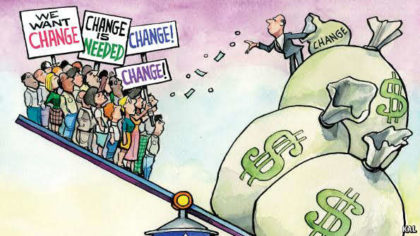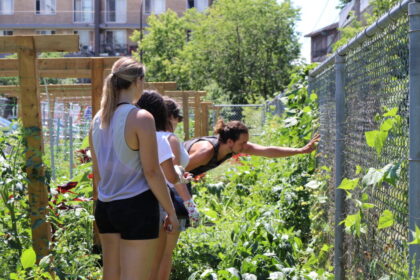
Description
Economic Restructuring GEOG/URBS 450
Lessons
Course Information
Class day and time: Wednesday 2:45 – 5:30PM
Classroom: MB 3.285 SGW
Office Hours: By Request via Zoom
Email Address: economicrestructuring@erikchevrier.ca
Course Description
This course examines the nature of economic restructuring in late capitalism and the implications that industrial restructuring trends are having for the geography of industries, the structure of firms, workplace relations, and workers’ rights. It examines the new challenges that restructuring presents for both economic development prospects and labour market policies, as well as looks at contemporary initiatives to promote more socially and environmentally sustainable development paths.
In this course, we focus on an emerging field of Economic Geography known as ‘diverse economies’ originated by Gibson-Graham. Students learn about more ethical ways of understanding and creating labour, enterprises, transactions, property, and finance. Themes covered in the course include capitalism, post-capitalism, cooperatives, alternative economies, ecological economies, self-managed enterprises, community enterprises, unpaid labour, collective labour, gleaning, reciprocity, alternative currencies, time-banks, fair trade, social procurement, communing, community finance, methodology, subjectivity, among others.
Students get a practical approach to diverse economies through action research. Students create community projects, enhance existing projects, and/or interview members of community initiatives to get direct experience with the inner workings of alternative and non-capitalist enterprises.
Students also critically evaluate their roles as political, social, and economic agents by recognizing and evaluating their consumption habits, environmental footprint, labour practices, community involvement, and/or political participation.
Course Evaluation
| Participation | 10 (ongoing) |
| Student-Led Seminar | 20 (due date will be set in September) |
| 2 Blog Posts (Essay) | (25 each) 50 (due October 13th and November 17) |
| Action Research Project | 20 (due December 1st) |
| Total | 100 |
Blog Posts (Essays about Diverse Economies): Students will write two blogs of about 600 – 1000 words about a topic related to diverse economies covered in the course lectures and/or required readings. Although this is a blog, the information conveyed must come from research, not conjecture. In addition, the blog must contain at least five reliable, valid, credible sources and reference the course readings. Students with production skills can produce a video or a podcast instead of a blog; however, this must also be approved by me (Erik Chevrier).
Student-led seminar: Beginning on October 20th students will lead a seminar by reading the required material and preparing a presentation and discussion for the class. Students will be evaluated on their ability to identify the central claim(s) or thesis(es) of the texts and articulate it in our own words, synthesize the readings in a clear, informative manner, lead a discussion about the chapter and provide examples and/or case studies that support or contradict the arguments put forth in the chapter they are presenting. Students must also submit a paper copy of their presentation.
Participation: Regarding the participation grade, you will receive 5 out of 10 points for attending all the classes. The remainder of the grade is based on your involvement in discussion and participation in classroom activities.
Action Research Project: This assignment aims to give students hands-on experience by participating in community economies. Students will perform a critical-participatory-action-based research project by creating a new community initiative and/or participating with an already existing community initiative at Concordia University or in the community at large. Students may also interview a community group, map a sector of a diverse economy or write a traditional research report about diverse economies. Students must form a group; however, they may choose to work on something in a group that already exists and/or create something with like-minded people outside the classroom. Students will form clusters and contribute to the project based on their area of expertise. For example, someone with great research skills could get involved with the research portion of the project, someone with media skills can build media infrastructure, someone with great interpersonal communication skills can be the mobilizer, among other tasks. Students will be evaluated based on the depth of their involvement with the project, their deliverables, clearly reporting their contribution to the project, an oral presentation summarizing their role in the project, and linking the project to the course material.
Handing in Assignments:
You MUST submit all assignments in HARD COPY at the beginning of class on the due date. Unless you are given permission (in advance), assignments received by e-mail will not be graded. Late assignments will not be accepted without adequate documentation of medical or personal emergencies.
Letter Grade Equivalency
Your numerical grades will be converted to letter grades as follows:
A+ (93 – 100%) B+ (77 – 79.9%) C+ (67 – 69.9%) D+ (57– 59.9%)
A (85 – 92.9%) B (73 – 76.9%) C (63 – 66.9%) D (53 – 56.9%)
A- (80 – 84.9%) B- (70 – 72.9%) C- (60 – 62.9%) D- (50 – 52.9%)
F < 50%
Required Book:
Gibson-Graham, J.K., Dombroski, K. (2020) The Handbook of Diverse Economies, Elgar.
Strongly Recommended Books for Beginners:
Other Recommended Readings for Advanced Students:
Olin Wright, E. (2010) Envisioning Real Utopias, Verso
Brown and Timmerman (2015) Ecological Economics for the Anthropocene, Columbia University Press
Course Format
This course consists of a variety of pedagogical styles including lectures, discussions, guest speakers, and/or community service learning (as part of the action research project). In class, students participate in interactive activities, discussions and have occasional visits from community organizers. At times, the class participates in fieldtrips on and off campus. Students will be notified in advance by e-mail and in class prior to these events. The format may change over the course of the semester to adapt to circumstances surrounding the pandemic.
Course and Reading Schedule
Changes to the syllabus may occur over the course of the semester. Students will be notified of any alterations. Students are expected to complete ALL the required readings BEFORE EACH CLASS. Students are also expected to attend ALL classes and participate in class discussions.
September 8th
Class 1 – Introduction
September 15th
Class 2 – Introduction to Diverse Economies
Required Readings:
Gibson-Graham, J.K., Dombroski, K. (2020) The Handbook of Diverse Economies, Elgar.
Chapter 1 – Introduction to the Handbook of Diverse Economies: Inventory as Ethical Intervention
September 22nd
Class 3 – Enterprise
Required Readings:
Gibson-Graham, J.K., Dombroski, K. (2020) The Handbook of Diverse Economies, Elgar.
Chapter 2 – Framing Essay: The Diversity of Enterprise
Chapter 3 – Worker Cooperatives
Chapter 4 – Self-Managed Enterprise: Worker-Recuperated Cooperatives in Argentina and Latin America
Chapter 5 – Community Enterprise: Diverse Designs for Community-owned Energy Infrastructure
September 29th
Class 4 – Enterprise
Required Readings: (please read 40 paged of any of the readings below)
Gibson-Graham, J.K., Dombroski, K. (2020) The Handbook of Diverse Economies, Elgar.
Chapter 6 – Eco-social Enterprises: Ethical Businesses in a Post-Socialist Context
Chapter 7 – Enterprising New Worlds: Social Enterprise and the Value of Repair
Chapter 8 – Anti-Mafia Enterprise: Italian Strategies to Counter Violent Economies
Chapter 9 – State and Community Enterprise: Negotiating Water Management in Rural Ireland
Chapter 10 – Independent and Small Businesses: Diversity Amongst the 99 Percent of Businesses
Chapter 11 – Homo Economicus and the Capitalist Corporation: Decentering Authority and Ownership
October 6th
Class 5 – Labour
Required Readings:
Gibson-Graham, J.K., Dombroski, K. (2020) The Handbook of Diverse Economies, Elgar.
Chapter 12 – Framing Essay: The Diversity of Labour
Chapter 13 – Precarious Labour: Russia’s Other Transition
Chapter 14 – The Persistence of Informal and Unpaid Labour: Evidence from UK Households
Chapter 15 – Paid and Unpaid Labour: Feminist Economic Activism in a Diverse Economy
October 13th
Class 6 – Labour
Required Readings:
Gibson-Graham, J.K., Dombroski, K. (2020) The Handbook of Diverse Economies, Elgar.
Chapter 16 – Caring Labour: Redistributing Care Work
Chapter 17 – Non-Human ‘labour’: The Work of Earth Others
Chapter 18 – Collectively Performed Reciprocal Labour: Reading for Possibility
Chapter 19 – Informal Mining Labour: Economic Plurality and Household Survival Strategies
Chapter 20 – Migrant Women’s Labour: Sustaining Livlihoods Through Diverse Economic Practices
October 20th
Class 7 – Transactions
Required Readings:
Gibson-Graham, J.K., Dombroski, K. (2020) The Handbook of Diverse Economies, Elgar.
Chapter 21 – Framing Essay: The Diversity of Transactions
Chapter 22 – Gleaning: Transactions at the Nexus of Food, Commons and Waste
Chapter 23 – Direct Producer-Consumer Transactions: Community Supported Agriculture and Its Offshoots
Chapter 24 – Direct Food Provisioning: Collective Food Procurement
Chapter 25 – Alternative Currencies: Diverse Experiments
October 27th
Class 8 – Transactions
Required Readings:
Gibson-Graham, J.K., Dombroski, K. (2020) The Handbook of Diverse Economies, Elgar.
Chapter 26 – Transacting Services Through Time Banking: Renegotiating Equality and Reshaping Work
Chapter 27 – Fair Trade: Market-based Ethical Encounters and the Messy Entanglements of Living Well
Chapter 28 – Social Procurement: Generating Social Goof Through Market Transitions
Chapter 29 – Sharing Cities: New Urban Imaginaries for Diverse Economies
November 3rd
Class 9 – Property
Required Readings: (please read 40 paged of any of the readings below)
Gibson-Graham, J.K., Dombroski, K. (2020) The Handbook of Diverse Economies, Elgar.
Chapter 30 – Framing Essay: The Diversity of Property
Chapter 31 – Commoning Property
Chapter 32 Community Land Trusts: Embracing the Relationality of Property
Chapter 33 – Urban Land Markets in Africa: Multiplying Possibilities via a Diverse Economy Reading
Chapter 34 – A Slow Food Commons: Cultivating Conviviality Across a Range of Property Forms
Chapter 35 – Free Universities as Academic Commons
Chapter 36 – Diverse Legalities: Pluralism and Instrumentalism
November 10th
Class 10 – Finance
Required Readings: (please read 40 paged of any of the readings below)
Gibson-Graham, J.K., Dombroski, K. (2020) The Handbook of Diverse Economies, Elgar.
Chapter 37 – Framing Essay: The Diversity of Finance
Chapter 38 – Islamic Fiance: Diversity Within Difference
Chapter 39 – Rotating Savings and Credit Associations: Mutual Aid Financing
Chapter 40 – Indigenous Finance: Treaty Settlement Finance in Aotearoa New Zealand
Chapter 41 – Community Finance: Marshalling Investments for Community-Owned Renewable Energy Enterprises
Chapter 42 – Hacking Finance: Experiments With Algorithmic Activism
November 17th
Class 11 – Subjectivity
Required Readings: (please read 40 paged of any of the readings below)
Gibson-Graham, J.K., Dombroski, K. (2020) The Handbook of Diverse Economies, Elgar.
Chapter 43 – Framing Essay: Subjectivity in a Diverse Economy
Chapter 44 – More-than-human Agency: From the Human Economy to Ecological Livlihoods
Chapter 45 – On Power and the Uses of Genealogy for Building Community Economies
Chapter 46 – Techniques for Shifting Economic Subjectivity: Promoting an Asset-Based Stance with Artists and Artisans
Chapter 47 – Affect and Subjectivity: Learning to be Affected in Diverse Economies Scholarship
Chapter 48 – Diverse Subjectivities, Sexualities and Economies: Challenging Hetero and Homonormativity
Chapter 49 – Journeys of Post Development Subjectivity Transformation: A Shared Narrative of Scholars from the Majority World
November 24th
Class 12 – Methodology
Required Readings: (please read 40 paged of any of the readings below)
Gibson-Graham, J.K., Dombroski, K. (2020) The Handbook of Diverse Economies, Elgar.
Chapter 50 – Framing Essay: Diverse Economic Methodology
Chapter 51 – Translating Diverse Economies in Anglocene
Chapter 52 – Reading for Economic Difference
Chapter 53 – Field Methods for Assemblage Analysis: Tracing Relations Between Difference and Dominance
Chapter 54 – Visualizing and Analyzing Diverse Economies with GIS: Resource for Performative Research
Chapter 55 – Working with Indigenous Methodologies: Kaupapa Maori Meets Diverse Economies
Chapter 56 – Action Research for Diverse Economies
Chapter 57 – Focusing on Assets: Action Research for an Invlusive and Diverse Workplace
Chapter 58 – How to Reclaim the Economy Using Artistic Means: The Case of Company Drinks
December 1st
Class 13 – Wrap-up
A list of Student Services and Useful Resources
Counselling and Psychological Services: http://concordia.ca/students/counselling-life-skills
Concordia Library Citation and Style Guides: http://library.concordia.ca/help/howto/citations
Student Success Centre: http://concordia.ca/students/success
Health Services: http://concordia.ca/students/health
Financial Aid and Awards: http://concordia.ca/offices/faao
HOJO (Off Campus Housing and Job Bank): http://csu.qc.ca/hojo
Academic Integrity: http://concordia.ca/students/academic-integrity
Access Centre for Students with Disabilities: http://concordia.ca/offices/acsd
CSU Advocacy Centre: http://csu.qc.ca/advocacy
Dean of Students Office: http://concordia.ca/offices/dean-students
International Students Office: http://concordia.ca/students/international
Student Hub: http://concordia.ca/students
Sexual Assault Resource Centre: http://concordia.ca/students/sexual-assault.html
Indigenous Directions: http://concordia.ca/about/indigenous.html
University Rights and Responsibilities
Academic Integrity: “The Academic Code of Conduct sets out for students, instructors and administrators both the process and the expectations involved when a charge of academic misconduct occurs. The regulations are presented within the context of an academic community which seeks to support student learning at Concordia University.” (From Article 1 of the Academic Code of Conduct).
Full text:http://www.concordia.ca/students/academic-integrity/offences.html
Plagiarism: The most common offense under the Academic Code of Conduct is plagiarism, which the Code defines as “the presentation of the work of another person as one’s own or without proper acknowledgement.” This includes material copied word for word from books, journals, Internet sites, professor’s course notes, etc. It refers to material that is paraphrased but closely resembles the original source. It also includes for example the work of a fellow student, an answer on a quiz, data for a lab report, a paper or assignment completed by another student. It might be a paper purchased from any source. Plagiarism does not refer to words alone –it can refer to copying images, graphs, tables and ideas. “Presentation” is not limited to written work. It includes oral presentations, computer assignment and artistic works. Finally, if you translate the work of another person into any other language and do not cite the source, this is also plagiarism. In Simple Words: Do not copy, paraphrase or translate anything from anywhere without saying where you obtained it! Source: Academic Integrity Website: http://concordia.ca/students/academic-integrity
Disabilities: The University’s commitment to providing equal educational opportunities to all students includes students with disabilities. To demonstrate full respect for the academic capacities and potential of students with disabilities, the University seeks to remove attitudinal and physical barriers that may hinder or prevent qualified students with disabilities from participating fully in University life. Please see the instructor during the first class if you feel you require assistance.
For more information please visit: http://concordia.ca/offices/acsd
Safe Space Classroom: Concordia classrooms are considered ‘safe space classrooms/virtual classrooms’. In order to create a climate for open and honest dialogue and to encourage the broadest range of viewpoints, it is important for class participants to treat each other with respect. Name-calling, accusations, verbal attacks, sarcasm, and other negative exchanges are counter-productive to successful teaching and learning. The purpose of class discussions is to generate greater understanding about different topics. The expression of the broadest range of ideas, including dissenting views, helps to accomplish this goal. However, in expressing viewpoints, students should try to raise questions and comments in ways that will promote learning, rather than defensiveness and feelings of conflict in other students. Thus, questions and comments should be asked or stated in such a way that will promote greater insight into the awareness of topics as opposed to anger and conflict. The purpose of dialogue and discussion is not to reach a consensus, nor to convince each other of different viewpoints. Rather, the purpose of dialogue in the classroom is to reach higher levels of learning by examining different viewpoints and opinions with respect and civility.
I acknowledge that Concordia University is located on unceded Indigenous lands. The Kanien’kehá:ka Nation is recognized as the custodians of the lands and waters on which we gather today. Tiohtiá:ke/Montreal is historically known as a gathering place for many First Nations. Today, it is home to a diverse population of Indigenous and other peoples. We respect the continued connections with the past, present and future in our ongoing relationships with Indigenous and other peoples within the Montreal community.(Indigenous Directions Leadership Group, Feb. 16, 2017)




